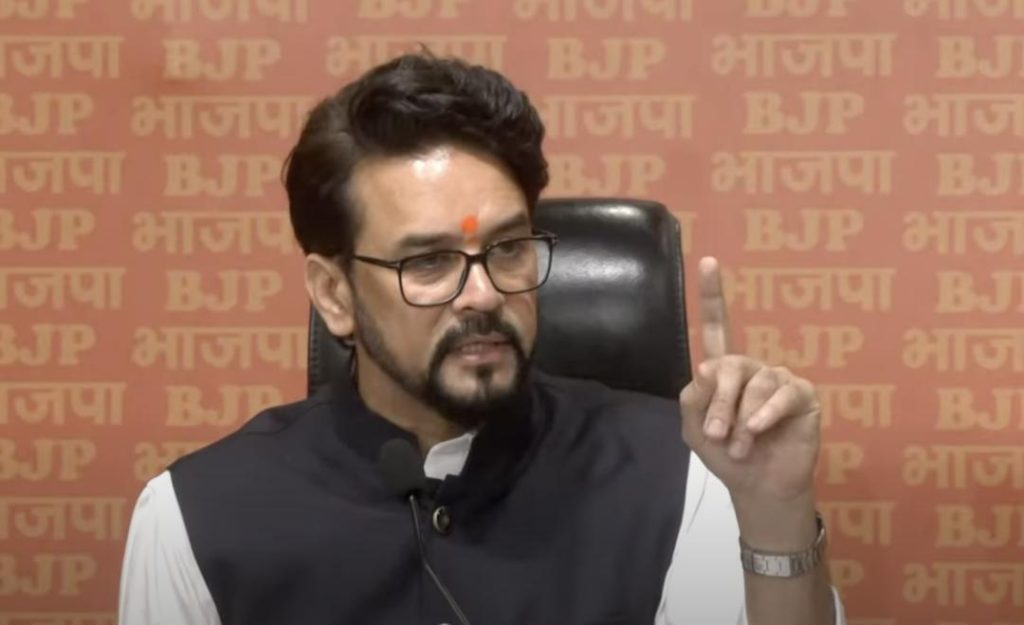
Congress & CPI made Bhimrao Ambedkar lose the poll in 1952: BJP
In a shocking revelation, BJP MP Anurag Thakur recently accused the Congress party of laying the foundation of electoral corruption in the very first election of 1952. According to Thakur, the Congress and Communist Party of India (CPI) jointly defeated Dr. Bhimrao Ambedkar, a constitution maker and a saint-like leader, in the election. This revelation has sent shockwaves across the political spectrum, with many calling for an investigation into the matter.
Speaking at a rally in Himachal Pradesh, Thakur said, “74,333 votes were rejected” in the election, implying that the Congress and CPI had rigged the polls to ensure Ambedkar’s defeat. “Congress ensured that a constitution maker, a Dalit leader, was eliminated in the very first election,” he added. This statement has sparked a heated debate, with many questioning the motives behind the Congress party’s alleged actions.
To understand the context of this issue, it is essential to revisit the history of the 1952 elections. The first general elections in India were held in 1951-52, with the Indian National Congress emerging as the largest party in the Lok Sabha. The elections were seen as a major milestone in Indian democracy, marking the transition from British colonial rule to a self-governing nation.
Dr. Bhimrao Ambedkar, who played a crucial role in drafting the Indian Constitution, was a prominent figure in the election. As the leader of the Scheduled Castes Federation, he was a strong advocate for Dalit rights and social justice. His party, however, did not fare well in the elections, with many attributing his defeat to the alleged rigging by the Congress and CPI.
Thakur’s statement has been met with a mixed reaction from various quarters. While some have hailed his bold move, others have criticized him for making unfounded allegations. The Congress party has denied any wrongdoing, claiming that the elections were conducted fairly and transparently.
However, if we look at the historical records, there are several instances that suggest that the elections were marred by irregularities and manipulation. For instance, the then Chief Election Commissioner, Sukumar Sen, had reported that a significant number of votes were rejected due to technicalities. This has led many to speculate that the Congress party might have used its influence to suppress Ambedkar’s chances of winning.
Moreover, Ambedkar’s defeat was seen as a major setback for the Dalit community, who had been eagerly waiting for his leadership to bring about social change. His loss was attributed to the Congress party’s alleged move to eliminate him as a rival, which had far-reaching implications for the country’s politics.
In recent years, there have been several attempts to revive Ambedkar’s legacy and promote his values of social justice and equality. The BJP government has been criticized for its perceived attempts to appropriate Ambedkar’s legacy for political gain. However, Thakur’s statement marks a significant departure from this approach, as it acknowledges the Congress party’s alleged role in Ambedkar’s defeat.
The implications of Thakur’s statement are far-reaching, as it raises questions about the integrity of India’s electoral process. If the allegations are proven true, it would be a major scandal that would undermine the credibility of the political system. It would also highlight the need for electoral reforms to ensure that the voices of marginalized communities are heard and respected.
In conclusion, Anurag Thakur’s statement has sparked a heated debate about the Congress party’s alleged role in Ambedkar’s defeat in the 1952 elections. While the allegations are serious and require a thorough investigation, it is essential to understand the historical context of the elections and the political landscape of the time. The Indian polity needs to have an open and transparent discussion about the past to ensure that the country moves forward on the path of social justice and equality.
Source: https://youtu.be/0kLyW5rSJSg






